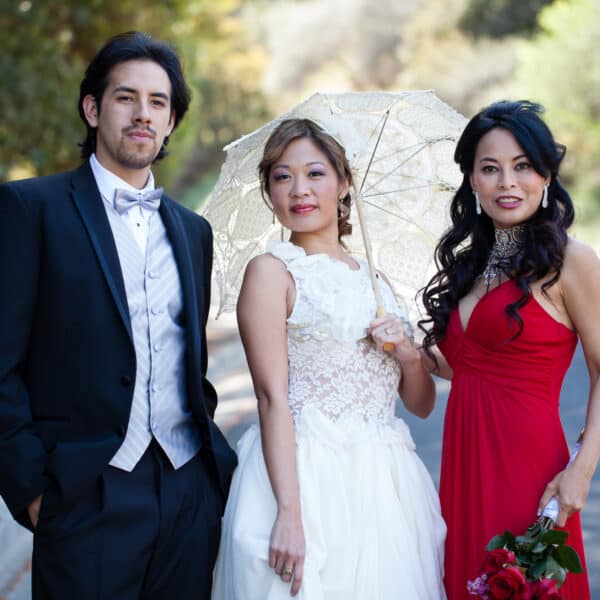Imagine this: A stunning bride elegantly steps down a stone-paved path. The sounds of a traditional wedding march fill the sun-drenched air punctuated by olive trees. Yes, you’ve arrived at a Greek wedding, a mesmerizing mosaic of joyous traditions and warm family moments.
Now, you might wonder what makes a Greek wedding so special. It’s all about vibrant customs dating back centuries!
Whether it’s choosing the luckiest date or preparing the marital bed with thoughtful symbols, it feels almost like stepping into an enchanting tale. And trust me, it’s not just about the couple. Each family member and friend plays their unique part in this love-filled epic.
Yes, from helping the groom shave to dancing in unison, everyone gets involved!
Are you ready to dive deep into this panorama of ancestral rites – rites steeped in symbolism, brimming with sentiments? Be prepared to smile, raise an eyebrow and maybe even shed a tear as we embark on an enlightening journey exploring the captivating landscape of Greek weddings!
So grab your glass of Ouzo as we absorb these time-honoured traditions and learn how they enhance matrimonial celebrations today. Let’s unveil the charm of Greek nuptials!
Analysis of Lucky Wedding Dates in Greek Culture
Ever considered tying the knot under the dazzling Grecian sun? Wait! Hold your Horses…err, I meant Greek chariots! Let’s start with decoding the timings that the Greeks find most auspicious for weddings. Yes, wedding dates are a deal-breaker here!
In Greek culture, each month and, indeed, every day holds its unique significance. Most famous is jolly June, considered propitious because of none other than Hera, the mighty goddess of marriage and fertility. A summer ceremony soaked in golden sunshine – doesn’t it sound like the ideal union to you?
But remember, just like life isn’t all sunshine and rainbows, there are specific periods that bear a big red flag. The first fortnight of August? Exclude it right away from your options!
It’s a period dedicated to Virgin Mary’s ascension to heaven – so weddings: a big no-no. And oh yes, remember Easter? That’s off-limits too! Steer clear from any matrimonial plans 40 days before this holy celebration.
So as you make those vital wedding-booking calls, ensure that you’re picking an auspicious day to ensure luck is on your side from Day 1 – the Greeks sure believe it will lead to a blissful marital journey!
TL;DR: Hera plays wedding date cupid for Greeks with June being the luckiest month to tie the knot. But steer clear of the first two weeks of August and 40 days before Easter – they’re deemed inappropriate for nuptials.
Exploration of Marital Bed Preparation Ritual
Let’s delve right into the ‘whys’ and ‘hows’ of one of Greece’s oldest and most adored wedding traditions – preparing the marital bed. It’s not just a simple ritual, but a full-fledged family affair that exudes joy, love, and enthusiasm.
Now picture this – close family and friends fluttering around, tugging at sheets, fluffing pillows, ensuring everything is perfect and pristine. Why all this fuss about a bed? Well, it’s symbolic of ensuring prosperity and fertility for the soon-to-be-married couple.
Money or rice scattered onto the bed – we’re talking cold hard cash coins and grains of abundance blessed by family members creating an atmosphere of flourishing prosperity.
Now comes the real heart melter. A bundle of joy – yes an adorable child, preferably one who has only known good fortune, is rolled around on this very bed! Before you go “Oh-el-aa”, know that this ritual symbolizes fertility for the couple.
So if you ever find yourself in the joyous whirlwind of a Greek wedding bed prep night, grab those coins or rice grains and join in because each grain you toss isn’t just starting off the newlyweds on their prosperous voyage, but it’s hinting at your place in their journey too!
TL;DR: The Greek tradition of preparing the marital bed revolves around family festivity showering prosperity (coins or rice) and fertility (a child rolled on the bed). So get tossing those grains and bless away!
Significance of Groom’s Shaving and Bridal Dressing
Switch gears and gear up for some intense brushes with age-old traditions. From shaving the groom’s face to the intricate bridal dressing, these mates are central characters in the Greek wedding story!
Here’s an occasion where the closest male friend trades his best man sash for a temporary barber tag – he helps with the ceremonial shave. Talk about #friendshipgoals!
Of course, this isn’t merely about grooming but symbolizes trust and a bond that transcends life’s ups and downs.
Now, let’s embrace the feminine side – bride dressing isn’t a task exclusively assigned to moms or bridesmaids – it’s open to all special ladies in her life!
And there’s a bonus: those still on their journey to Mr. Right get to pen down their names on the bride’s shoes! A belief runs that this act edges them closer to their impending nuptials. Sweet, right?
But wait, a few secrets hide in the bridal clothing too – a coin tucked in her shoe promising financial fortune and sugar sprinkled literally into her glove for a life-etched sweetness. It’s these tiny nuggets of tradition that render a Greek wedding its unique flavor!
TL;DR: The ceremonial groom’s shave and bride dressing rituals in Greek weddings are emblematic of deep-seated symbolism. From single ladies scribbling their names on shoes to infuse life-fortunate sugar into dressings – it’s about more than meets the eye!
Integral Role of Koumbaro and Koumbara at Greek Weddings
Move over best man and maid of honor, it’s time to meet the Koumbaro and Koumbara – the Greek wedding VIPs. Don’t be fooled by that sweet couple swaying to the music. Their role is pivotally more than rhythmically maneuvering with two left feet on the dance floor!
The Koumbaro (male) and Koumbara (female) are not just the couple’s best friends; they’re an integral part of their journey from singletons to a blissfully married couple.
Yes indeed, they even interchangeably hand over the rings during the holy matrimony ceremony!
However, their responsibility extends beyond the big day. Becoming a Koumbaro or Koumbara isn’t merely about donning fancy suits or lifting champagne glasses in a toast.
The Greeks view them as potential godparents to any future little ones the couple may have. Talk about stepping up their friendship game!
So as you watch a Greek wedding, remember that behind all that cheerful laughter and fizzy champagne, are key pals vowing not only to bear witness but walk every life phase together with the soon-to-be-married couple.
TL;DR: The roles of a Koumbaro and a Koumbara aren’t restricted to just being best buddies during a Greek wedding – it encompasses being godparents for future offspring, signifying an everlasting glue in friendships!
Decoding Good Luck Symbols in Greek Weddings
Get ready to immerse yourself into the world of charms, chants, and numerology because it’s time to demystify the good luck symbols abundant in Greek weddings.
Let’s talk numbers! Very specific numbers, actually – odd ones to be precise. And, of course, the divine number three – an embodiment of the holy trinity.
Why the fascination? Simple! They’re seen as indivisible expressions of unity—symbolizing unbreakable bonds between the couple. Isn’t that just splendid?
Hold on! Here comes a showstopper – ever heard about ‘spitting’ for good luck? No, no, I don’t mean a real spit-splash! It’s more of a soft ‘ftou ftou ftou’ breathy whisper; preferably thrice after offering congratulations or compliments to ward off any evil eyes or jinxers – sort of like their distinctive version of “knock on wood!”
Through seemingly quirky symbolisms to deep-rooted spiritual metaphors, Greeks lace their matrimonial ceremonies with blessings and good fortune galore – an enticing blend that enhances and accentuates their nuptial heritage!
TL;DR: Symbolism rules Greek weddings! Embark on an intriguing journey with odd numbers and even ‘spit-spells’ symbolizing unbreakable bonds and warding off ill-luck for the newly-weds. It’s all about keeping things lucky and love-loaded in Greece!
Understanding the Blessing and Exchange of Rings Tradition
Let’s switch gears to a perennial classic of all weddings – ring exchange, but with a twist! Because when it comes to Greek nuptials, it’s a ritual bathed in blessings and symbolisms.
And no, you’re not seeing double – those rings do indeed get swapped back and forth between the couple. Three rounds to be precise.
But why? Meet the symbolic Holy Trinity again, tying the invisible yet significant bond between the couple and heavenly oversight.
Yet, it’s not just an “I do” moment; it’s unforgettably embellished by the officiating priest’s blessing. The ceremony resonates with an ethereal energy as soon as those blessing utterances fill the air, bestowing an umbrella of divine protection upon the couple’s life journey together.
In essence, these Greek tradition gems subtly knit love into each ceremonial step taken towards saying “Till death do us part.” They magnify not just an earthly union but also one that resonates with divine blessings!
TL;DR: In Greek weddings, sanctification prevails over symbolism during ring exchange – swapping rings thrice mirrors the Holy Trinity, while priest blessings elevate this union beyond mere earthly bounds.
Impact of Candle and Common Cup Traditions
Switch up the spotlight to some other luminous participants in a Greek wedding – the candles. With their warm glow, they illuminate not just the matrimonial setting but also signify a profound symbolism.
Clasped in the couple’s hands, these flickering flames resonate beyond mere radiance. They are representatives of Christ’s illumination and an invitation for divine blessings – a beacon of hope guiding their journey through marital seas.
But wait, there’s more! We’re pouring in another tradition – utilizing a common cup. This isn’t any regular newlywed toast. Think deep intimacy as the couple sip thrice from a shared goblet – once again serving up that divine symbol, the Holy Trinity.
These sips represent coming together in total unity, reminiscent of how every joy and sorrow will be bolstered or borne together henceforth. Now isn’t that warming your hearts already?
TL;DR: Candles aren’t just decor at Greek weddings – they’re symbols of Christ’s light and blessings. Add warming sips from a common cup thrice, reinforcing the holy trinity symbolism and you’ve got traditions blending perfectly to ensure matrimonial bliss!
The Majestic Stefana (Wedding Crowns) Tradition
Hold onto your fascinators as we unlock one of the Greek wedding traditions that out-glitter the rest – the Stefana tradition. Well, if crowns have you imagining Disney princess vibes, simmer down a bit. These marital crowns are more sublime and less flamboyant.
Crafted traditionally from flowers, foliage or precious metals, they represent the ‘stefania’ or bond that unifies two souls into a single couple. These delicate creations aren’t just pretty head adornments but strong symbols of your “better half” becoming your “best half”.
So, as you watch a Greek bride and groom being crowned during their big day procession, it’s not about pomp. Those delicate headpieces echo millennia-old tradition – a stunning testament to the couple’s commitment to becoming a unified force.
As with most traditions in a Greek wedding, the Stefana straddle the past and present perfectly – marrying ancestral heritage with today’s celebrations!
TL;DR: The Stefana (wedding crowns) aren’t mere wedding adornments at Greek nuptials – they hold centuries worth of symbolic significance that echoes the beautiful hurdle via matrimonial bliss!
Experiencing Traditional Greek Wedding Dances
Swing your hips and tap your feet – it’s time to dive into the energetic swirl of traditional Greek wedding dances. Can you feel those contagious beats already?
Forget about those carefully choreographed first dance routines. In Greece, it’s all about an ensemble performance with guests lacing up their dancing shoes around in a circle.
As the night goes on, this increasingly enthusiastic jig becomes the party’s throbbing pulse, embodying a real sense of community spirit, unity, and joy.
But here comes the showstopper – the last dance! Reserved exclusively for the newly minted Mr. and Mrs., it’s their moment to set the dance floor ablaze. Gyrating under a shower of money bills raining down from guests – a token for future prosperity, wouldn’t you say?
Wedding dances aren’t merely about foot-tapping fun in Greece but mirror a joyful celebration of marital bonds – one that wouldn’t be replete without every guest diving in!
TL;DR: Dancing at Greek nuptials isn’t just about grooving; it’s an emblem of unity where everyone joins the circular dance, culminating with newly-weds’ final jig under a money shower symbolizing ensuing prosperity!
Custom of Greek Wedding Bonbonnieres
Let’s end this Greek wedding trip on a sweet note, literally! You’ve danced to enthralling Greek music, admired the Stefana, now it’s time for a little keepsake – bonbonnieres.
Bonbonnieres are no ordinary goody bags. These adorable little bundles are filled with Koufeta – sugar-coated almonds. Like most elements in a Greek wedding, these delightful treats are brimming with symbolism too!
Are you wondering why they’re meticulously counted to be an odd number? Higher math has nothing to do with it; it all boils down to numbers symbolizing indivisibility and the couple’s enduring union.
Who wouldn’t wish for a marriage characterized by purity (read: white almonds), fertility (yep, almonds have got that one covered too), and endurance (you’ve got to break that sugar-almond shell, right?).
Oh, did we mention how unwed ladies get to tuck Koufeta under their pillow to dream up their Mr. Right?
You see, Greek weddings aren’t just steeped in tradition; they’re awash with heartfelt sentiments and hope-filled customs.
TL;DR: Bonbonnieres in Greek weddings house more than treats; Koufeta (sugar-coated almonds) virtues like purity, fertility, and lasting marriage make them emblematic gifts that even sprinkle good luck for those still awaiting cupid’s arrow!
Frequently Asked Questions
1. What’s with Greek weddings and odd numbers?
Well, odd numbers have a rather ‘complicated’ relationship with Greek wedding charms. They are seen as indivisible, symbolizing the strong unity between the couple. So, don’t worry if you see those numbers featuring frequently – it simply means more good luck for the lucky pair!
2. Why is there a tradition of writing names on bride’s shoes?
You think it’s just a fashion statement? Nope! In a classic Greek wedding tradition, single ladies scribble their names on the bride’s shoes. The legend goes that this will bring them closer to their own happy ending.
3. What’s the point of the groom being shaved by his best man?
The big shave isn’t merely a grooming routine but symbolizes trust and strong ties between friends. If that isn’t friendship goals, we don’t know what is!
4. Why do the newlyweds dance under a shower of money?
Hit pause on envisioning a wild Vegas party! At Greek weddings, this tradition symbolizes showering prosperity upon the newlyweds as they step onto their marital journey.
5. What are Koufetas in bonbonnieres?
Koufetas are sugar-coated almonds tucked neatly into bonbonnieres or goody bags handed out at Greek weddings. They represent purity and fertility – sweet tokens from an even sweeter tradition.
6. Are guests expected to participate in Greek wedding dances?
Absolutely! Traditionally, guests join hands and dance in circles during a Greek wedding party. So, it’s time to dust off your dancing shoes!
Wrapping It Up
As we’ve seen, Greek weddings are not merely ceremonies; they’re full-blown festivals, brimming with soulful symbolism, priceless traditions, and unforgettable merriment. From lucky dates to dancing nights away, these occasions are a vibrant reminder of culture’s invaluable role in binding us together – just like an indivisible Greek wedding charm!
Whether you’re planning your big day in Mykonos or merely attending one, stepping into the world of Greek nuptials opens up a fascinating Pandora’s box where each detail dazzles with its unique significance and charm. So here’s to the exciting blend of fun, frolic, and meaningful traditions that make up the delightful journey called a Greek wedding!
- Delightful Greek Wedding Traditions: A Deep Dive Into Cultural Heritage - September 25, 2023
- No Friends to be Your Bridesmaids? Here’s What You Should Do - September 24, 2023
- Egyptian Wedding Traditions: Unveiling the Mysteries of the Age-old Traditions - September 19, 2023




Leave a Comment